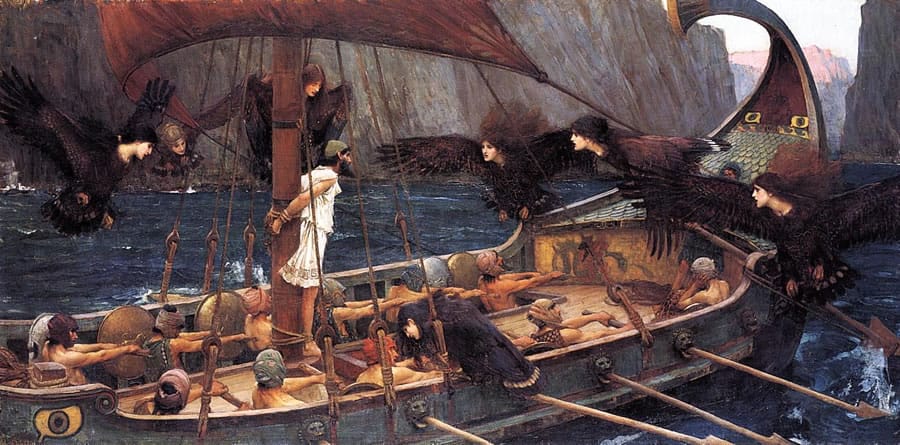
Homer “The Odyssey” Essay
The works of the ancient poet Homer the “Iliad” and the “Odyssey” are the first known to us monuments of ancient Greek literature. These are epic poems, in which the basis of the plot are the events of the Trojan War (XII century BC), during which the Mycenaean-Achaean warriors invaded and plundered the city of Troy. This event marked one of the earliest stages of the struggle between the peoples of Asia and Europe, and was the source of numerous myths, legends, tales. Between the poems there is a very strong logical connection, and it is possible that the “Odyssey” was conceived as a continuation of “The Iliad”.
The “Odyssey” is a classic poem, which tells about the adventures of a mythical hero named Odysseus during his return home after the Trojan War, as well as the adventures of his wife, Penelope, who was waiting Odysseus on Ithaca.
The main plot of “The Odyssey” is the story about the return of Odysseus to Ithaca after the war with Troy, which was very long and took 10 years. In IX-XII songs Odysseus himself tells of his travels after leaving Troy in the first three years. The next songs describe all the adventures of Odysseus on his way home, where at this time Penelope, Odysseus’ faithful wife, was waiting for him for 20 years.
Almost all episodes of wandering Odysseus have numerous fabulous parallels, but their comparison with similar tales shows that in the poem fabulous material has undergone substantial transformation in the rationalistic direction. In the poem are also widely used popular folk stories.
The image of the central hero is the embodiment of the ideas about the human ideal. The epic hero always have perfect physical and moral qualities, but the Odyssey is the first hero in world literature who together with bodily perfection has high intelligence. Odysseus is a mythological hero, the grandson of the god Hermes, patron of commerce and thieves, from whom he took intelligence, agility and practicality. But in the poem is not emphasized the divine origin of the hero, although he, as an epic hero, is a brave warrior, a master of melee and archery. Though there are many people who surpass him in military prowess and physical strength, but Odyssey has no equal in his intelligence, cunning, initiative, patience, in arts of words.
Just as I
have come from afar, creating pain for many—
men and women across the good green earth—
so let his name be Odysseus . . .
the Son of Pain, a name he’ll earn in full.
In the “Odyssey” was first time in the literature when the physical power was defeated by the power of intellect. Odysseus’s intelligence has a wide range: from selfish ruse to sublime wisdom, that is why it is the bright mind the main advantage of Odysseus. Homer says that Odyssey has a strong will, initiative, insatiable curiosity and interest in the new lands, life, love to family, home. But Odysseus also has numerous human weaknesses: he is arrogant, boastful, prone to momentary fear, despair. Odysseus is the most controversial, and therefore the most modern of all the heroes of ancient epic.
Many researchers stress the remarkable depth of the image of Odysseus, his complete personality. Odysseus embodies the ancient demand of balance, while depicted in various roles: as a wise king, a loving husband and father, a brave warrior, an eloquent and resourceful politician, brave wanderer, lover of the goddess, suffering exile, the legislator, the triumphant avenger, a favorite of Athens. (Mack et al., p.223)
It is important to stress that the Odyssey by Homer is the architect of his own happiness, and at the same time, he saves society from lawlessness and anarchy, restoring justice. The success of Odysseus comes out of his patience, allowing him to overcome serious troubles and obstacles on the way home. He just wants to get home for his wife Penelope and son, and the value of home is better than richest (Mack et al., p.198).
So then,
royal son of Laertes, Odysseus, man of exploits,
still eager to leave at once and hurry back
to your own home, your beloved native land?
Good luck to you, even so. Farewell!
But if you only knew, down deep, what pains
are fated to fill your cup before you reach that shore,
you’d stay right here, preside in our house with me
and be immortal. Much as you long to see your wife,
the one you pine for all your days . . .
Odysseus in his rush into the unknown, and at the same time striving home, is experiencing the fullness of life. His example is important for modern readers to, as he helps to realize that our real challenge is to discover who we are, what is really important to our life, to realize our own pride and to become a better person.

